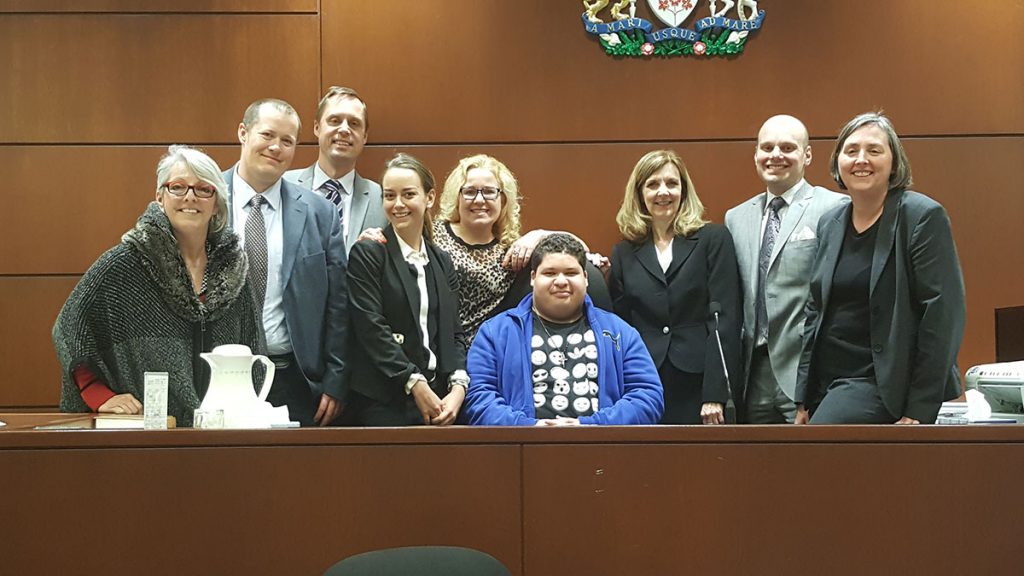By: Lily MacLeod on behalf of the Osgoode Hall Family Law Association
Canada’s Economic and Social Context
In Canada, 1 in 6 adults live with a disability. Compared to their able-bodied counterparts, adults with a disability are more likely to lack a post-secondary education, be unemployed, and live in poverty. The overall Canadian poverty rate is approximately 10%. However, over 14% of those with a disability live in poverty. The Ontario Disability Support Program (ODSP) is a financial support accessible to adults with a disability. However, this form of social assistance is difficult to attain and sparse at best. It does not pay the bills – especially for those who are unable to work and receive no voluntary financial support from their families.
The Decision
It is in this troubling context that Coates v Watson emerges – a recent Ontario decision which makes child support accessible to adult children with a disability whose parents never married. The case contemplates the constitutionality of section 31 of Ontario’s Family Law Act (FLA). The provision applies to parents who were never married and obliges unmarried parents to pay child support for their adult child, but only if that child is attending school full-time. Compare that provision to the federal Divorce Act which applies to married spouses. This piece of legislation obliges married parents to pay child support for their adult child if the child is enrolled in full-time education or is unable to work due to illness, disability, or other cause. The court found that the distinction between the two pieces of legislation is arbitrary and assaults the dignity of disabled children of unmarried parents.
Judge Sullivan acknowledges that the circumstances of people with disabilities have often been and continue to be disregarded – in inaccessible buildings, hospitals that lack sign language interpreters, and ableist legislation. Section 31 of the FLA “assumes that children over the age of majority will be self-sufficient unless they are in full time school. It does not consider the needs and circumstances of adult children who are unable to leave a parent’s charge or obtain necessaries of life by reason of temporary or permanent disability.”
Judge Sullivan notes that, “disabled children of unmarried relationships, and their residential parents, most often mothers, face economic hardships and insecurity not visited upon those whose parents married. It is substantively discriminatory that children and residential parents have diminished access to financial resources as a result of the parents’ marital status.”
Judge Sullivan further notes that “even if the perfect public supports were in place for people with disabilities, the legislative regime here denies access to child support to ‘illegitimate’ children in contrast to ‘legitimate’ children, sending the message that the claimant families are less worthy of respect, concern and consideration. The offence to dignity is substantively discriminatory.” As a result, the court concludes that section 31 infringes the equality guarantee in section 15(1) of the Charter on the grounds of disability, marital status, and sex and is not saved by section 1. The court recommends reading in the definition of “child of the marriage” from the Divorce Act into the FLA.
Ultimately, the court affirmed that child support is the right of the child and acknowledged that children ought not to be treated differently based on their disability and the spousal status of their parents. The Ontario government agrees. In response to this decision, the provincial government has promised to amend the FLA to mirror the provisions of the Divorce Act. This decision takes pressure off the public purse since private sources will now be obligated to provide support for adult children with disabilities.
Implications for Family Lawyers
A mother, Robin Coates, brought this constitutional challenge before the court. As a result, she is now able to obtain child support for her 22-year-old son who is diagnosed with DiGeorge Syndrome. This illness involves physical and cognitive health symptoms that demand full-time supervision and care.
The decision expands the definition of what it means to be a child for the purposes of child support. Therefore, the decision gives family lawyers “more options” to present when advising their clients. Previously, if an unmarried mother wanted child support for her adult child who was not in school, there was not much a lawyer could do to help. Now, single mothers are empowered to pursue child support from parents with an income.
The other side of the coin: this expanded definition may lead to more litigation. New questions arise: Will parents be obliged to pay the standard child support table amount for adult children with disabilities? If not, how will child support amounts be calculated, particularly if an adult child is receiving ODSP? These questions remain unanswered but one thing is clear: this decision is a positive step in the fight towards accessibility for adult children with disabilities.
Sources
